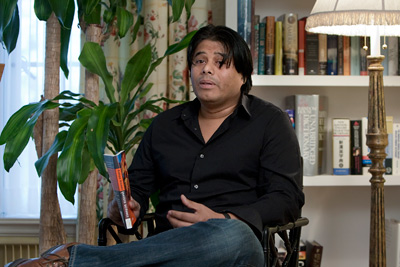Quiñonez relates Spanish Harlem tale at Literary Luncheon
By Daniel Aloi

Assistant Professor of English Ernesto Quiñonez entertained a Literary Luncheon audience with tales of growing up in Spanish Harlem and culture shock on a book tour, Dec. 2 at the Cayuga Heights home of President David Skorton and Professor Robin Davisson.
Quiñonez read the opening chapter of his debut novel, "Bodega Dreams," set in his old neighborhood among boys who become drug dealers.
"One thing I try to do in my literature is humanize the inhuman," he said. "That's why I have junkies, drug lords, whores, rapists."
His rich, descriptive prose essayed life among the characters there, including the angelic girl in school, the teachers and his narrator's best friend, Sapo.
"Sapo was different. ... I loved Sapo," he read. "I loved Sapo because he loved himself, and I wanted to be able to do that, to rely on myself for my own happiness."
The tough, confident Sapo "had a reputation for biting" and his real-life counterpart fell off a roof and died at age 14, Quiñonez said.
"To have a name other than the one your parents had given you, it meant you had status in school, you had status on your block," he read. "This didn't mean you were home-free, it simply meant bigger guys would think twice before starting something with you."
His narrator finally earns a name, for having "straight black hair courtesy of my father's Ecuadorian side of the family, and because Kung Fu movies were very popular at the time," he read. "When I was in the eighth grade, I was tagged Chino."
"Bodega Dreams" was named one of the notable books of 2000 by both the Los Angeles Times and The New York Times, and became required reading in high schools and colleges across the country. But those laurels, and appearances on NPR's "Fresh Air" and "Charlie Rose" on PBS, didn't really impress his parents, Quiñonez said. It took a mention in the Spanish-language newspaper El Diario to do that.
Quiñonez also remembered the book tour for "Bodega Dreams," which sent him to Texas to read at El Paso Community College. Checking into a motel outside of the city, he recalled: "I walk in, and this lady is eating meatloaf. She asks me, 'Do you want a cat?' I smiled and said, 'No, thanks, I already have a cat at home.' She said 'No, for your room -- there are mice. Do you want a cat?' They had these cats behind the desk in little cages."
His second novel was "Chango's Fire," published in 2005. He is now working on a new novel and a collection of short stories.
"There have been storytellers since we left the caves, and even when we were in the caves," he said. "I'm trying to write about some socially conscious stuff -- about America, whether it falls or fails."
The Literary Luncheon series, now in its third year, invites Cornell and Ithaca-area writers and community members to gather for free, informal readings. A light lunch of local foods, usually prepared by Cornell Catering, is offered to guests. The series continues in the spring with featured writers to be announced.
Get Cornell news delivered right to your inbox.
Subscribe